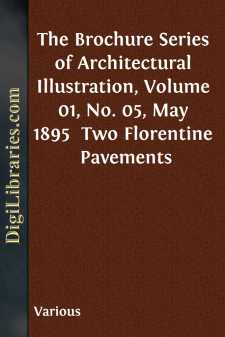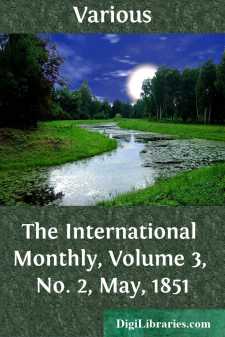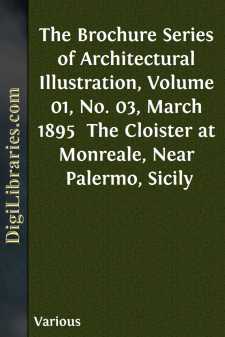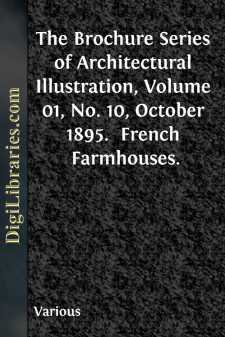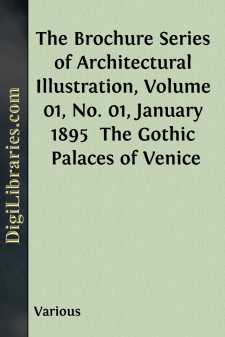Periodicals
- Art
- Children's periodicals 59
- Entertainment 5
- Food/Wine 2
- Games/Humor 455
- General 661
- Health 1
- History 53
- House/Home 1
- Regional 62
- Science/Nature 118
- Transportation 10
Art Books
Sort by:
by:
Various
WOMEN AND LITERATURE IN FRANCE. From a sprightly letter from Paris to the Cologne Gazette, we translate for The International the following account of the position of women in the French Republic, together with the accompanying gossip concerning sundry ladies whose names have long been quite prominently before the public: "It is curious that the idea of the emancipation of women should have...
more...
by:
Various
TWO FLORENTINE PAVEMENTS. The church of San Miniato al Monte, just outside the walls southeast of Florence, and the Baptistery, or church of San Giovanni Battista, in Florence, are among the finest examples of the Tuscan Romanesque style, and both probably date from about the same time—the early part of the twelfth century—although the date of San Miniato has until recently been referred several...
more...
by:
Various
CIVIL AND DOMESTIC ARCHITECTURE.—I. The term Civil and Domestic Architecture includes all public and private edifices, that is to say: honorary monuments, such as triumphal arches and tombs; buildings for the instruction of the public, such as museums, libraries and schools; houses for public amusements, as theatres, amphitheatres and circuses; structures for public service, as city-halls,...
more...
by:
Various
MILLERISM. Toward the close of the last century there was born in New England one William Miller, whose life, until he was past fifty, was the life of the average American of his time. He drank, we suppose, his share of New England rum, when a young man; married a comely Yankee girl, and reared a family of chubby-cheeked children; went about his business, whatever it was, on week days, and when Sunday...
more...
by:
Various
THE FUTURE OF CHINA. The late reconquest by China of some of her former possessions in Central Asia, and the firm tone in which she is urging her demands upon Russia, in respect of the Kuldja territory, are giving her a prominence as a factor in Asiatic politics which she can scarcely be said to have claimed before. These signs of tenacity of purpose, if not of actual vitality, acquire an additional...
more...
by:
Various
GEORGE WILKINS KENDALL. We have here a capital portrait of the editor in chief of the New Orleans Picayune, George W. Kendall, who, as an editor, author, traveller, or bon garçon, is world-famous, and every where entitled to be chairman in assemblies of these several necessary classes of people. Take him for all in all, he may be described as a new Chevalier Bayard, baptized in the spirit of fun, and...
more...
by:
Various
THE CLOISTER AT MONREALE, NEAR PALERMO, SICILY. The island of Sicily, being in form nearly an equilateral triangle, with one side facing towards Italy, another towards Greece, and the third, towards Africa, was a tempting field for conquest to the various nations surrounding it. It was successively overrun by the Greeks, Carthaginians, and Romans, and later, after the Christian era, again successively...
more...
by:
Various
FRENCH FARMHOUSES. As it is the purpose of THE BROCHURE SERIES to cover as wide a field as possible in choice of subject matter for its illustrations, and at the same time hold rigidly to the idea of furnishing only what will be useful to its subscribers, it has seemed desirable to present something a little nearer our everyday life than the Italian work which has thus far formed the greater part of...
more...
by:
Various
RENAISSANCE PANELS FROM PERUGIA. The carved walnut panels from the choir stalls of the Church of San Pietro de' Casinense in Perugia, designed by Stefano da Bergamo in 1535, which are given as illustrations in this number, are excellent examples of the ornament of the later period of the Italian Renaissance. This form of ornament was first used in flat painted panels upon pilasters, such as the...
more...
by:
Various
I. SOUTHWEST ANGLE OF THE DUCAL PALACE, VENICE. Although the Ducal Palace is much larger than the other palaces of Venice, and intended for general civic uses as well as a residence for the Duke or Doge, it follows closely the type already described. It has undergone so many changes since its first foundation in about the year 800 (813 according to Ruskin), having been destroyed five times, and as...
more...



